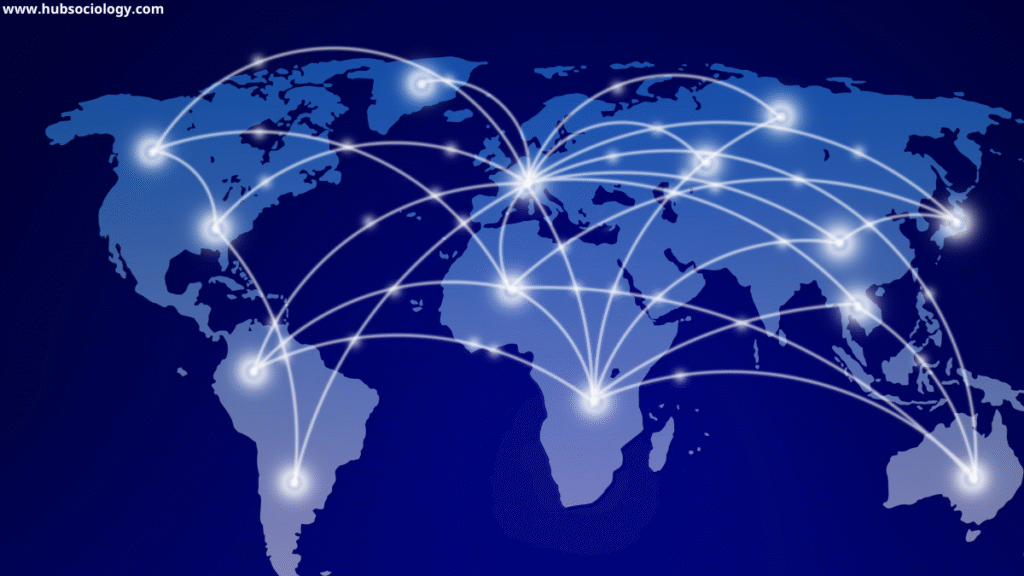Introduction on Sociology of the Global System
The concept of development has long been a central theme in sociology, especially in understanding the global system and its structural inequalities. The “sociology of the global system on development” refers to the sociological study of how global structures—such as capitalism, international institutions, colonial legacies, and cultural flows—shape the developmental trajectories of different societies. This field examines not only the economic dimensions of development but also the social, political, and cultural forces that determine why some nations progress while others remain underdeveloped. Sociologists seek to understand development as a socially constructed and globally interconnected process that reflects power relations among nations, classes, and institutions.

Understanding the Global System
The global system refers to the interdependent network of nations and institutions linked through economic, political, and cultural exchanges. This system is not neutral—it is hierarchical. The global economy is divided into core, semi-peripheral, and peripheral regions, a concept originally developed by sociologist Immanuel Wallerstein in his World-Systems Theory. According to Wallerstein, the core nations (such as the United States, Western Europe, and Japan) dominate global trade and finance, while peripheral nations (mostly in Africa, Latin America, and parts of Asia) provide cheap labor and raw materials. Semi-peripheral countries like India, Brazil, and South Africa occupy an intermediate position, simultaneously exploiting weaker nations while being dependent on the core.
This global hierarchy emerged through historical processes of colonization, industrialization, and capitalist expansion. The development of core nations depended on the exploitation and underdevelopment of peripheral societies. Thus, the global system is a dynamic structure of inequality that continuously reproduces uneven development.
Development as a Sociological Concept
Development, from a sociological standpoint, is not merely economic growth measured by GDP or industrial output. It includes the transformation of social institutions, human capabilities, and cultural orientations. Sociologists emphasize social development—the enhancement of social equality, education, health, democracy, and gender justice—as key components of genuine progress.
Modernization theorists of the mid-20th century, such as Talcott Parsons and W.W. Rostow, viewed development as a linear process of modernization in which traditional societies evolve into modern, industrialized nations. They argued that by adopting Western values—individualism, rationality, and technological innovation—developing countries could achieve progress. However, sociologists from dependency and world-systems perspectives criticized this view for ignoring historical exploitation and global inequalities. They argued that underdevelopment is not a result of internal failure but a structural condition produced by the global capitalist system.
Historical Roots: Colonialism and Global Inequality
The roots of global inequality can be traced to colonialism, which reorganized the world economy around the interests of European powers. Colonies supplied raw materials and cheap labor, while the colonizers built industries and accumulated capital. This pattern of extraction and dependency continued even after decolonization through neo-colonialism, where economic and political control was maintained by global financial institutions and multinational corporations.
Postcolonial sociologists such as Andre Gunder Frank and Samir Amin argued that the world capitalist system deliberately keeps certain regions dependent. They introduced the concept of the development of underdevelopment, which means that the development of wealthy nations depends on the systematic underdevelopment of poorer ones. For example, the extraction of resources and cheap labor from Africa and Latin America enriched Europe but left these regions impoverished and dependent on global markets.
The Role of Global Institutions
The global system is maintained through powerful international institutions such as the International Monetary Fund (IMF), World Bank, and World Trade Organization (WTO). These organizations claim to promote global development, but sociological critiques reveal that they often serve the interests of the core nations. Through policies of structural adjustment and austerity measures, these institutions impose neoliberal economic reforms on developing countries—privatization, deregulation, and free trade—that prioritize global capital over local welfare.
Such policies often lead to increased inequality, unemployment, and loss of social welfare in peripheral societies. For example, IMF-imposed austerity programs in the 1980s and 1990s caused significant social distress in African and Latin American countries, where public services like education and healthcare were cut to repay foreign debts. Sociologically, this reflects how global institutions reproduce the power asymmetry between the global North and South.
Globalization and Cultural Transformation
Globalization has deepened the interconnectedness of societies but also intensified inequalities. Sociologists view globalization as a double-edged process—it creates opportunities for cultural exchange and technological diffusion but also leads to cultural homogenization and dependency. Western consumer culture dominates global media and entertainment, shaping lifestyles and aspirations across the world. This “cultural imperialism” weakens local traditions and reinforces the cultural dominance of the core countries.
Anthony Giddens and Ulrich Beck describe globalization as a process of reflexive modernity, where societies continuously reshape their identities in response to global forces. However, globalization also generates new forms of resistance—local movements for environmental justice, indigenous rights, and fair trade reflect attempts by peripheral groups to reclaim autonomy and redefine development in their own terms.
Alternative Perspectives on Development

Sociologists and critical thinkers propose alternative models of development that go beyond economic growth. These include:
- Human Development Approach: Championed by Amartya Sen and the UNDP, this perspective emphasizes expanding human capabilities—education, health, and freedom—as the true measure of development.
- Sustainable Development: Focuses on balancing economic progress with environmental conservation. Sociologically, it recognizes the interdependence between human societies and nature.
- Participatory Development: Advocates for involving local communities in decision-making rather than imposing top-down policies. This approach values indigenous knowledge and social inclusion.
- Post-Development Theory: Radical thinkers like Arturo Escobar argue that the entire idea of “development” is a Western construct that marginalizes alternative ways of living. They call for decolonizing development by respecting diverse cultural and ecological worldviews.
Global System and Social Stratification
The global system mirrors the patterns of social stratification seen within societies. Just as individuals and groups within a country occupy unequal positions based on class, gender, or race, nations too occupy hierarchical positions in the world order. Core nations act as the “upper class” of the world system, controlling technology, finance, and political power, while peripheral nations form the “lower class,” dependent and vulnerable.
This global stratification creates a system of transnational inequality, where the benefits of globalization are unequally distributed. The migration of labor, outsourcing of production, and flow of capital are all shaped by this inequality. For example, while Western consumers enjoy cheap goods produced in Asia, factory workers in developing countries face exploitation and poor working conditions.
Challenges and the Future of Global Development
The 21st century poses new challenges for the sociology of development. Climate change, pandemics, and digital inequality reveal the fragility of the global system. The COVID-19 crisis, for instance, exposed how global supply chains and healthcare systems are deeply unequal, with poorer nations suffering more due to lack of resources and vaccine access. These crises highlight the need for global solidarity and cooperative approaches to development.
Moreover, emerging economies like China, India, and Brazil are reshaping global power dynamics. The rise of South-South cooperation and regional alliances offers an alternative to Western-dominated models. However, these changes also bring new tensions, such as competition for resources and environmental degradation.

Conclusion on Sociology of the Global System
The sociology of the global system on development reveals that development is not a purely national project but a global process deeply rooted in historical inequalities and power relations. From colonialism to globalization, the global system has shaped who develops and who remains marginalized. Sociological analysis helps uncover the structural forces that perpetuate inequality and invites us to envision a more just, sustainable, and participatory form of global development. True progress can only occur when the global system is transformed from one of domination and dependency into one of cooperation and shared humanity.
Do you like this this Article ? You Can follow as on :-
Facebook – https://www.facebook.com/hubsociology
Whatsapp Channel – https://whatsapp.com/channel/0029Vb6D8vGKWEKpJpu5QP0O
Gmail – hubsociology@gmail.com
Topic-related Question on Sociology of the Global System
5 Marks Questions on Sociology of the Global System
- What is meant by the global system in sociology?
- Explain the sociological meaning of development.
- What is the core idea of Immanuel Wallerstein’s World-System Theory?
- Define neo-colonialism in the context of global development.
- Mention any two global institutions that influence development policies.
10 Marks Questions on Sociology of the Global System
- Discuss the sociological critique of modernization theory in understanding global development.
- How does dependency theory explain underdevelopment in peripheral nations?
- Examine the impact of globalization on cultural diversity and social change.
- Describe the role of IMF and World Bank in shaping the development agenda of the Global South.
- Explain how global inequality reflects social stratification at the international level.
15 Marks Questions on Sociology of the Global System
- Critically analyze Immanuel Wallerstein’s World-Systems Theory as a framework for understanding global development and inequality.
- Evaluate the impact of colonialism and neo-colonialism on the development trajectories of postcolonial nations.
- Discuss various alternative models of development—Human, Sustainable, and Participatory—from a sociological perspective.
- How does globalization reproduce inequality in the global system? Illustrate with sociological examples.
- Assess the role of sociological theories in redefining development for a more equitable and sustainable global future.

3 thoughts on “Sociology of the Global System on Development”